Fibre made from recycled cloth towels and hemp stronger than cotton
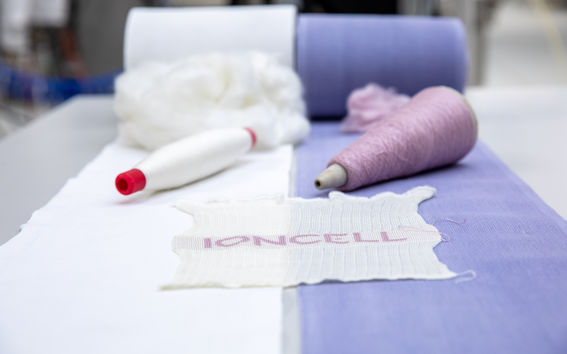
There is no shortage of recycled raw material; while habits vary by country, some estimates suggest, for example, the average American consumer throws away over 35 kg of clothes per year. Until now, most of it has become energy waste, but researchers and companies are rapidly developing better ways to use valuable raw materials.
One key initiative bringing companies and research institutions together is the Aalto University-led Finix project. Lindström, which makes cloth towel dispensers – the ones you see in, for example, public restrooms – wanted to make better use of the material left after towel rolls have completed their service.
‘Lindström’s cotton towel roll can be washed and reused up to 100 times, drying hands around 11,000 times over its life cycle. It has been inspiring to be involved in the Finix project to find new uses for towel rolls when they reach the end of their service life,’ says Lyydia Pertovaara, Service Concept Designer from Lindström.
The collaboration made use of Ioncell, a method developed by Aalto University for producing high-quality textile fibre from wood or recycled materials such as recycled paper, cardboard or textile waste.
‘The quantity of waste was large and of uniform quality, so it was great material for the study,’ explains researcher Marja Rissanen from the Ioncell group.
With the method, the cotton towel rolls first passed through an acid bath, which split up the cotton polymer chains. After that, Krishna Ojha, who carried out his Master's thesis as part of the project, dissolved the material in an ionic liquid and then spun the fibres under the guidance of postdoctoral researcher Inge Schlapp-Hackl.
The Ioncell method has previously produced strong fibres, but the strength now obtained surprised even the researchers themselves.
'The tensile strength achieved in the tests was better than that of fibres made from wood cellulose and up to 2.5 times higher than that of virgin cotton. We have not obtained such strong fibres in the past,’ Rissanen explains, adding that this strength is made possible by the dry jet wet spinning method.
'This method places the polymer chains of the cellulose in highly oriented form, whereas in cotton they are in spirals and a weak point exists whenever the spiral change the direction.’
The excellent results also mean that towels made from the recycled Ioncell fibres could be recycled not only once but several times, further improving the sustainability of the process.
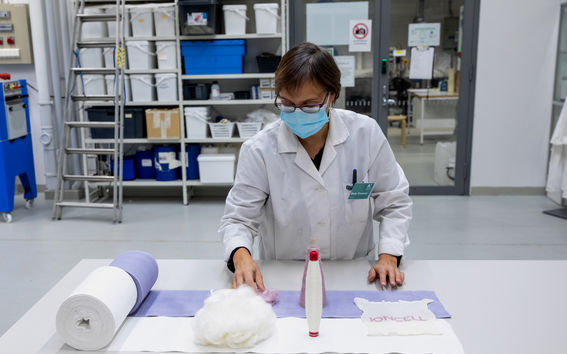
Shiny, soft and durable
In another Finix project study, student Susanna Raiskio from Metropolia University of Applied Sciences was the first to make Ioncell fibre from hemp.
‘The properties of the material only improved in the recycling process, which was a positive surprise. Compared to the original hemp knit, the Ioncell knit was more shiny, softer and more durable,’ Raiskio tells.
The high uniformity and high tenacity of Ioncell fibres made from worn-out hemp fibres enabled the production of spun yarns more than three times stronger than yarn made from original hemp.
Marja Rissanen then tested the durability of both the original knitted hemp fabric and the knitted fabric made from recycled fibres in the Metropolia laboratory using the Martindale abrasion test, which is used to test the durability of outdoor clothing and upholstery fabrics.
‘The abrasion resistance of the Ioncell fabric was twice that of the original hemp fabric,’ Rissanen reports.
Abrasion resistance and tensile strength both improve the durability of textiles. High tensile strength also enables faster industrial manufacturing processes. However, Rissanen emphasises that until now only individual Ioncell samples have been produced, and the durability of the fibre within industrial processes and for everyday use has not yet been tested. This may change as early as next year, however, when the Ioncell fibre pilot manufacturing line will be ready for use and daily fibre production capacity will increase 100-fold, from 100g to 10kg.
Jenni Haukio to wear gown made of sustainable Ioncell material at December’s Independence Day reception
Ioncell is a new technology that creates high-quality textile fibres from wood or recycled materials.
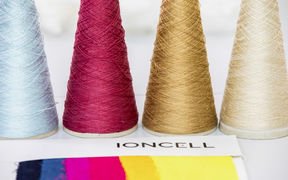
From birch to poppies – how the fabric was created for Marimekko’s unique shirt dress
The yarn spun from Ioncell® fibre is stronger than its commercial equivalent and performed excellently in the printing process and washing tests. The chemicals used to make the fibre were completely recycled too.
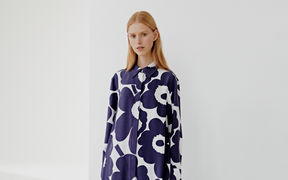
- Published:
- Updated:
Read more news

Aalto ARTS alum Vidha Samya’s artwork featured at the Venice Biennale 2024
The Pavilion of Finland presents ‘The pleasures we choose’ at the 60th International Art Exhibition – La Biennale di Venezia until 24 November 2024.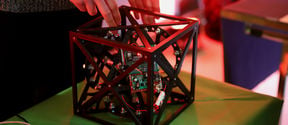
IoT Forge donates EUR 1 million to the School of Engineering
The donation will be used for research and education on the Industrial Internet and digital twins.
Join us for the first Aalto Open Science Award Ceremony
All Aaltonians are welcome – no registration required!